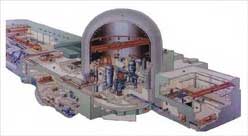South Korea is rising to become the sixth largest country in the world in nuclear energy production and nuclear technology, with re-export activities to the United States and France.
Currently, South Korea is emerging as a pioneer in the field of nuclear technology with its long-term and mid-term nuclear project, the second phase of which is set to conclude at the end of 2006.
 |
Diagram of the Korea Standard Nuclear Power Plant (KSNP) |
By the end of this year, South Korea hopes to solidify its position as the sixth largest country in the world in nuclear energy production and nuclear technology re-export to the United States and France.
This project began in 1997 with efforts aimed at bridging the gap between advanced nuclear technology powers and safeguarding core nuclear technology.
Over the 10-year period, 1.2724 trillion won has been invested to develop a uniquely South Korean technology, which has transformed the country into an advanced nuclear energy nation.
Design and construction projects have materialized with the Korea Standard Nuclear Power Plant (KSNP) boasting a capacity of 1 million kilowatts, being “the first commercialized plant in 1998,” and advanced pressurized water reactors (APWR) that are planned for completion in 2012 and 2013.
Previously, South Korea relied on imported nuclear fuel to produce nuclear energy, but it has become more proactive since achieving domestic production capabilities.
South Korean-style nuclear fuel is supplied to commercial nuclear power plants, and core components are exported to Westinghouse in the United States and INB, a nuclear fuel collaboration in Brazil.
Another highlight of this 10-year project is the development of the “Advanced Thermal-Hydraulic Safety Assessment (ATLAS)” aimed at assessing nuclear safety in new nuclear reactors and addressing potential risks associated with various types of nuclear materials.
The Ministry of Science and Technology announced these highlights and many other achievements on Monday (April 17) in the form of a preliminary analysis of the contributions from the second 10-year project, while declaring that South Korea has joined the ranks of advanced nations in the nuclear technology field.
The Ministry also mentioned that they are drafting a 5-year project expected to commence next year aimed at establishing two new long-term projects. This project will cost approximately 1 trillion won and will focus on research aimed at developing next-generation nuclear technologies and conducting feasibility studies for exporting technology and new products.




















































